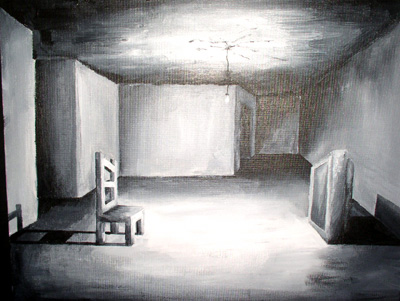Serendip is an independent site partnering with faculty at multiple colleges and universities around the world. Happy exploring!
Notes Towards Day 12: Re-ordering Our Dream Space

Notes Towards Day 12:
Re-ordering Our Dream Space
| |
 |
Taylor Swift, Change (from Owl)
The Blow, Nothing (from holsen39)
I. coursekeeping
NAMING?!
Before you leave for/just after you return from break,
please post a mid-semester course evaluation on-line
I remind you also to check, before you leave, that you have 7 postings.
* If you have had to miss class, a way to make up would also be to do some
additional postings, reflecting on the topics we discussed while you were gone...
* I also loved it that this week, finally, you were writing in response to one another...
I hope we can keep that up!
**there's more to say about your papers, too, esp. how much we enjoyed the creativity w/ which
many of you wrote, the ways you played w/ both language and images....as well as your exploratory thinking:
thank you for that also!
![]()
![]()
II. When we return from break, Kristin will conduct us through
three days' exploration of disability, sex and gender
in preparation, please read
one book-length work, Nancy Mairs, Waist-High in the World
& two essays available on-line @ ~adalke/gasworks:
Lennard Davis, "Constructing Normalcy"
Rosemarie Garland-Thomson, "Seeing the Disabled"
the next paper will be due @ the end of that section of the course,
on Friday, Oct. 30: 6-pps on questions of sex, gender and disability,
using the texts we've read in class, and one or more others.
Kristin will be available for conferences if you'd like to meet w/
her before or after the paper is due.
![]()

III. so, to pick up where we left off on Tuesday, and to move us on-->
from the forum:
general advice on the "syllaship" (Because a bus isn't big enough :)
Owl: It is physically impossible to be able to fit everyone's thoughts and ideas into one course.
Oak: I feel like we want to expand...There is, unfortunately, pretty much an infinite number of directions we can go, and I don't know how we can decide.
Beta: one thing I noticed most of all is this need to push into the "space" outside of our own experiences. Be it in actual space such as other countries, or gendered spaces like masculinity and genderqueer. There also seems be a desire to use information about the world ourselves to bridge to gap between these two spaces, i.e. activism....to think of history and experience as a continuum of interations that are constant informing and reforming our identities.
rae: i was really hoping that i’d learn lots of new stuff and really push the boundaries of what i know with this class, and i feel like that’s not going to happen....it’ll be fine....i think i can probably learn a lot just from hearing about things from other people’s perspectives.
eshaw: the benefit of being in a class and being surrounded by people of differing opinions and differing backgrounds is that we have a chance to exchange with each other....no matter what subject matter we choose to study or what we choose to “do” over this second half of class, I want us all to learn from each other, and hear about how each of us take the ideas that we are presented with in class and use them in our own way.
justouttheasylum: this is not just a class. It's our class. We shouldn't give up.
[but let's not "just" do history]:
twig: please not history, something more dynamic and applicable
Karina: One thing I would like to caution us against...is the trap of history.....I think that the general feeling in the class is that we want to move forward, we want to progress, we want to take things to the next level. As someone said today, this class is too important and unconventional to just rehash things in it, to waste it. So...we should be careful that we’re not just setting ourselves up for a “history lesson” without a means of moving forward.
ebock: please no history of gen/sex. been there, done that.
let's do do Kate Bornstein
Oak: think most of us want to read Kate Bornstein. I definitely think it would be beneficial to do so before seeing her.
Elephant: I want to get the most out of this class and I think I'll be able to get that through continued class discussion on works that push boundaries. That's why I strongly feel we should continue on the Kate Bornstein path. I think we were able to get a lot out of the fact that we could read Sherry Ortner's work as well as getting to meet and talk with her. And the fact that we found her slightly outdated, I think Kate Bornstein will be a nice breath of fresh air. I have a lot of confidence in being able to see her and I would love to accompany that with one of her books.
(but)
Terrible2s: because she is visiting I think she will already have her time....I’m sure I’ll be very impressed with her but maybe we could give her just a reasonable amount of our time and energy.
what about activism?
Terrible2s: I really think we should take this class beyond its academic restrictions. Activism please!
cmorais: I would really like to come up with a final project that incorporates this notion of “activism” that many people have mentioned.
Owl: all the papers connect: this idea that we must get out of the academic world and explore what we do in class outside....it's so easy to stay stuck in a room, compelled to read up on things we've never learned before...but it's come to the point where we must...ask ourselves, "do we simply want to repeat what others have done or move far beyond it?"
(but)
Alice: It seems weird to me that a section on activism would need to be included in the curriculum....
activism should exist outside of academia and in the "real" world.
Cantalope: I agree with Alice, it seems bizarre to me to study activism....My dream is that being radical and reckless is a way of life, you know? It ISN'T just going to a protest. ...I think that giving a project about something with activism is a terrible idea because what's worse than not being radical than forced radicalism?
Elephant: I agree with Cantaloupe about learning about activism. I don't really see the practicality of learning about activism if we're not in fact active ourselves....I think with our limited time in the rest of this class, we should still keep it primarily academic.
rae: i'd love to go *do* something, try to make some kind of difference. at the same time, this is a class, and i'm not sure what we can do. and i agree with some of the stuff that Cantalope has said. and i’m not sure how/if we can do something to make this class more than just discussion about this, discussion about that, more of the same stuff we’ve been doing.
eshaw: I am still a major proponent of getting an “active” component into this class (“active” being distinct from “activism” which implies a certain kind of radical nature which has been explored a little already…) and I still feel pretty strongly about that. That being said, I don’t think that being “active” has to involve volunteering, protesting, or making any kind of grand, public gesture. I think that just communicating with one another, and taking a moment to digest the content of those exchanges, is a movement towards enacting change
holsn39: the word "activist"...includes action related to ourselves. By actively changing yourself you are changing the world....Being a non-conformist doesn't mean you have to convince other people to be a non-conformist. The first ...and what I see as the most important step...is living with the intention to not compromise your individuality and contribution to diversity, and not to accept efforts/influences that might encourage this compromise....the extent at which every individual wishes to take this rebellion is up to them.
dshetterly: I want my college education to shake my shit up, to break down everything I “know” and provide me with the tools to rebuild. Then I want to be able to use my knowledge to make a meaningful contribution to the world....I think it is a mistake to assign activism as a project. Mandating it strips it of its purpose and strips us of our agency. If you guys want to be more active, do it! We need to learn how to be active through practice, not by doing it as a project
we're also of (@ least) two minds re: masculinity:
Terrible2s: it would be interesting to re-introduce us to men! Can we hear about masculinity? Can we hear how men have done other things in this field but be either oppressive or gay?
Alice: I find it interesting that so many of us (including myself!) are interested in exploring masculinity. It seems like our whole lives have been centered around a masculine curriculum....we could be so used to studying men that we feel like a course that doesn't particularly focus on masculinity at any point would essentially be missing something- something of importance.
Rhapsodica: I feel like we ought to problematize masculinity the same way we often problematize femininity and issues relating to women....I feel like it is important to think about the construct of masculinity...in a class on gender and sexuality, it is important for us to think about how we are all impacted by the categories and boxes that we keep recreating; I think it's bigger than just women.
rae: i really don't have any particular desire to learn more about men in this class....i agree with Rhapsodica, though...we should remember that masculinity is not the same thing as men/males....masculinity is not just what men do....it might be interesting to look at masculinity through the lens of a book like Judith Halberstam's Female Masculinity or Morty Diamond's From the Inside Out: Radical Gender Transformation, FTM and Beyond
twig: do women who are women and female and identify with all of that...get some part of masculinity...?
so (trying to juggle all this!!)
here's a proposal from me and Kristin for the remainder of the semester
(a proposal only, but we decided we needed to sort through our discussion
and give us something concrete to work with-and-on)--
some guiding principles:
1. draw on on-campus resources (visit from Bornstein, Picano, perhaps Funari and/or Glasser?)
2. use non-traditional "texts" (another graphic novel, 2 films,
as per ebock: looking intentionally at how stories can be told differently)
3. make pop culture the background (take turns selecting theme music/short video to start each class?)
4. make activism an on-going thread of the conversation--
and (if you chose to do this individually) some of its outcomes
![]()
3 Days on Transcending Gender (including self work and activism...)
Th, Oct. 29 & T, Nov. 3
one or two books by Kate Bornstein (how to choose?)
Gender Outlaw: On Men, Women and the Rest of Us (1995)
My Gender Workbook: How to Become a Real Man, a Real Woman,
the Real You, or Something Else Entirely (1997)
Hello Cruel World: 101 Alternatives to Suicide for Teens, Freaks and Other Outlaws (2006)
-----
Th, Nov. 5
MEETING (if you can) WITH KATE BORNSTEIN:
10-11:30 a.m. session confirmed (!!!) in Quita Woodward Room;
4 p.m. performance @ Villanova
-----
3 Days on Masculinity
T, Nov. 10
Michael Kimmel, “Masculinity as Homophobia: Fear, Shame and Silence in the Construction of Gender Identity." Reconstructing Gender: A Multicultural Anthology. Ed. Estelle Disch. New York: McGraw-Hill, 2002.
(with a visit from Howard Glasser?)
Th, Nov. 12
Chris Ware. Jimmy Corrigan: The Smartest Kid on Earth (graphic novel). New York: Pantheon, 2000.
-----
T, Nov. 17
Felice Picano (guest visitor), earlier memoirs-in-the-form of novels, or
Art & Sex in Greenwich Village: Gay Literary Life after Stonewall (2007)
2 days on Sex Work in the U.S. and Elsewhere
Th, Nov. 19
Kamala Kempadoo, "Women of Color and the Global Sex Trade: Transnational Feminist Perspectives." Meridians: Feminism, Race, Transnationalism (1, 2: Spring 2001): 28-51.
Born into Brothels (Video). Dir. Ross Kauffman & Zana Briski. Red Light Films, 2005 (83 min).
-----
T, Nov. 24
Live Nude Girls Unite! (Video). Dir. Julia Query and Vicky Funari. First Run/Icarus Films, 2000 (70 min.) (invite Vicki Funari, who's @ HC this year, to visit class?)
(are we imagining too many visitors? & so losing the opportunity to talk w/ one another...?)
Th, Nov. 26 T'GIVING
-----
2 days experimenting with language and storytelling
T, Dec. 1
Michelle Cliff, The Land of Look Behind and Claiming (1985)--
a prose poem "carving new shapes and forms for the King's English"
Th, Dec. 3
Lynda Barry, What It Is (2008)--a graphic novel/part memoir/part collage/part
workbook in which Barry instructs her readers in methods to open up their own creativity
N.B. Lynda Barry will being doing a presentation on "Writing the
Unthinkable" @ 7:30 on Fri, Oct. 23 in Sharpless Auditorium,
and also offering a writing workshop from 11 a.m. to 4 p.m.,
Saturday Oct. 24 and Sunday, Oct. 25 (they are holding some
spaces for GASWorks, so sign up NOW if interested!....this is
part of a symposium on "comics and the art of social transformation")
-----
F, Dec. 4: another round of conferences (w/ either Anne or Kristin)
leading to a 3-pp. proposal/first draft for final project
T, Dec. 8 & Th, Dec. 10: Final Performances
F, Dec. 18: FINAL PROJECTS DUE
(possibly collaborative? and a space for incorporating
issues we may not have addressed as a class,
but which are of particular interest to you)
![]()
III. break again into small groups
(do you prefer the same or different? maybe self organize?)
this time to fine tune...
A. how do you want to play w/-and-or alter our proposal re: content?
B. what suggestions do you have about pedagogy/how we handle the material?
C. what do you want to do re: output/projects?

wide range of suggestions from your papers:
choose some cultural product and report back to the group with observations
writing exercises:
--construct a non-mimetic representation of some experience of our own
--record a week of consciously acting, speaking, behaving in ways that avoid reinforcing the gender binary --change the way we speak & act:ask your family/friends why they use the language they use.
--think of 10 stories you’ve heard....
take/draw a picture, write a song/poem/story/scene/dialogue, make a movie/dance. create.
venture outside the classroom to record direct spoken exchanges; compile and analyze the data; use it to write writing that is masculine, feminine, beyond gender....
set up conventions (instead of inviting speakers to our class room):
organize close knit environments with people from the outside world
write a coming out story
move into action: protest the M/F stickers on SEPTA passes or observe a Transgender Day of Remembrance; write Op-Ed pieces re: gender, trans, genderqueer, queer, gender-nonconforming diversity; write legislators re: passing employment non-discrimination acts
interview individuals who have some connection to the topics we are discussing each week
conduct individual research on different forms of gender-related activism (NOW, HRC),
then share our findings in class in the form of a "jigsaw"
give individual reports of how gender and sexuality has affected different countries and cultures
take the information we have learned and use it to create change in a local arena
write weekly one-page position papers
conduct student-generated surveys to get peers' opinions and experience
engage in a community education/ analysis project:
go to a local highschool and present the things that we have learned in class
each of us picks a text from her own area of interest
each of us proposes her own personal project to enact change.....


